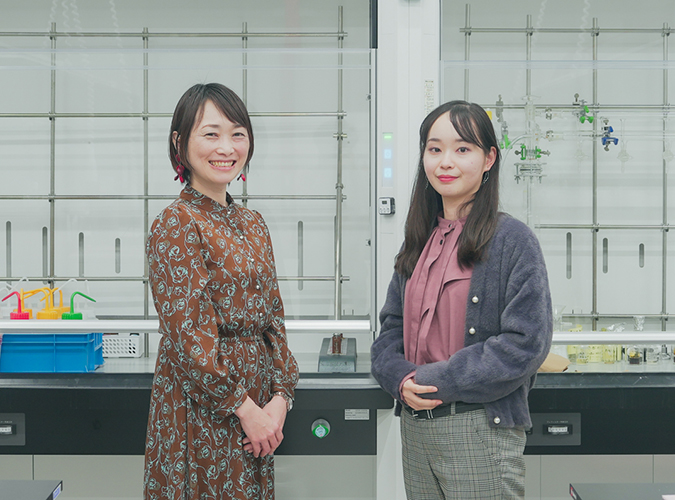150周年記念企画
「未来を拓く青学マインド」
作り出す商品で、
誰かにハッピーを届ける
|校友・卒業生|
ソニー株式会社
中橋 俊介
×
経営学部
経営学科 1年
下河 夏実
今年、青山学院は創立150周年を迎えました。学院から巣立った多くの卒業生が、学院での学びを糧に研鑽を積み、幅広い分野でキャリアを築いています。今回は、ソニー株式会社(以下 ソニー)でオーディオ分野の商品企画に携わる中橋俊介さんを、経営学部1年生の下河夏実さんが訪問しました。下河さんの将来の目標は、病気や障がいなど身体的課題を抱える方々のための洋服を手掛けるアパレル企業を経営することです。商品企画における心掛けや学生時代の過ごし方、夢を実現するための思考法についてお聞きします。
Profile
ソニー株式会社
中橋 俊介
2011年 経営学部 経営学科卒業


青山学院高等部から青山学院大学に進学し、卒業後、ソニー株式会社に入社。横浜営業所で営業を、国内のカメラ商品のマーケティングを担当した後、オーディオ事業の商品企画を担当。2017年から5年間アメリカに駐在し、2022年に帰任。現在はパーソナルエンタテインメント商品企画部にてワイヤレスイヤホンの企画に携わっている。

経営学部 経営学科 1年
下河 夏実
茨城・私立清真学園高等学校出身
高校生のときに、スーパーサイエンスハイスクール(SSH)*に指定されている母校独自のプログラムで、地方創生の観点からの商品開発や物産展の開催・販売を経験したことをきっかけに、商品の企画や開発に興味を持つ。将来の夢は、アパレル企業の経営者として、病気や障がいでファッションをあきらめている方々に喜びを感じていただける洋服を提供し、誰もが自由に自分らしさを表現できる社会を創ること。そのために、経営やアパレル業界に関する勉強に励みたいと考えている。
*将来の国際的な科学技術人材の育成を目的に、理数系教育に重点を置いた高等学校等を文部科学省が指定し、さまざまな側面から先進的な教育を実施し支援する制度。
TALK THEME
1st TALK
「商品企画をするうえで、
大切にしていることは?」
「自分たちが作り出す商品で、どうすれば人を
ハッピーにできるかということを一番に考えています」


下河さん
私は将来、アパレル企業の経営者になって、病気とりわけ難病によってファッションをあきらめざるを得ない方々のために、病気と共存できる洋服を作りたいと考えています。まずは大学で経営の知識を身に付け、アパレル業界についても学びながら、グループ活動では人をまとめる役割を積極的に担っていくつもりです。
アパレル業界でも、特に難病の方々に目を向けたのは、何かきっかけがあったのですか?

中橋さん

下河さん
非日常的な装いを堂々と楽しむ人々が集まるファッションショーの空間を見て、誰もが自由に洋服が楽しめる社会になったらいいな、と思っていました。そんななか、偶然見たテレビ番組で、紫外線に当たることができない難病の色素性乾皮症の方たちが、UV防護服を着て生活していることを知りました。この二つの経験がつながって、誰もがファッションで自由に自分らしさを表現できるよう役に立ちたい、というアイデアが生まれました。
なるほど。とても素敵な夢ですね。

中橋さん

下河さん
ありがとうございます。中橋さんは商品企画のお仕事をされているそうですが、どのような商品を担当されているのですか?
10年ほどヘッドホンやイヤホンの商品企画を担当してきました。現在は、完全ワイヤレスイヤホンの企画を手掛けています。

中橋さん

下河さん
これまでさまざまな商品を手掛けてこられたと思いますが、企画の成功・失敗を分けるポイントは何だと考えていますか?
一番大事なのは「わかりやすさ」だと思います。成功した商品は、「これはどういう商品?」と聞かれたとき、誰でもパッと明確に答えられる強みがあります。例えば今手掛けている完全ワイヤレスイヤホンの場合、「この商品はノイズキャンセリング性能が最高です」と明解に言い切れるような特徴です。逆に、「こういう良さもあるし、ああいう良さもあって…」と、いくつかの小さな特長を並べた中庸な企画は、印象に残りにくいです。特に、商品に詳しくない人でも一目で理解できる特長を持たせると、多くの人に選ばれやすいですね。

中橋さん

下河さん
私はアパレル業界に進みたいと思っていますが、ブランドがたくさんあり、大きな企業が市場を占めているなか、どうやって勝負すればよいのだろうか?と考えてしまいます。
それは、ものづくりに携わるすべての人が抱える悩みだと思います。私が担当しているヘッドホンやイヤホンの分野も、競合がひしめいていて、家電量販店の売り場には数えきれない量の商品が並んでいる状況です。商品の基本性能がコモディティ化してしまっているので、それ以外の特長で価値を提供しようと模索しています。たとえば、特に欧米では環境に対する意識も高く、環境保全団体とパートナーシップを組み、ヘッドホンが1台売れるごとにソニーが2ドル寄付する仕組みを作るなど、切り口を変えた施策を打っています。
それでも、ものづくりは最終的に商品のクオリティーに戻ってくるのかな、と思います。例えば、身体が動かしづらい方々に向けたアパレルであれば、新しい価値を考えることはもちろん大切ですが、「服がよく伸びるから袖を通しやすい」といった、本質的なクオリティーにこだわり抜くことが大切だと思います。そのクオリティーを体感した人が友達に話したり、Instagramに投稿したりするといったアクションにつながって、認知が広がることが期待できます。

中橋さん

下河さん
ソニーが、聴覚に障がいのある方でも楽しめる楽器を開発されたというニュースを拝見しました。過剰な心配かもしれませんが、障がい者に特化した商品を作ることで、一部の消費者が「自分は対象ではない」と感じて、顧客が離れてしまうことはないでしょうか?
そのような話は聞いたことがありません。ソニーでは、健常者と障がい者を区別しないバリアレスな社会の実現を目指し、すべての人にとって使いやすいデザインを共通の思想とした商品づくりを行っています。たとえば、最近のカメラには音声読み上げ機能が搭載されているモデルがありますが、それは視覚障がい者だけでなく、暗い場所での操作のしづらさを補うためにも役立っています。

中橋さん

下河さん
ユニバーサルデザインの視点ですね。では、企画の仕事をするうえで、一番大切にしていることは何ですか?
商品がまだ形になる前から常に考えているのは、自分たちが作り出す商品でどうすれば人をハッピーにできるか?ということです。たとえば、ヘッドホンなら、優れた音質で音楽が心地よく聞こえるとか、周囲のノイズがカットされて通勤電車の中でも心が安らぐとか、誰かに少しでも幸せな気持ちになってもらうことを最優先に考えています。ただ、これは商品企画に限らず、営業や販売会社での仕事の経験を通じて、メーカーで働いている以上、どんな部門にいても心掛けてきたことです。

中橋さん
2nd TALK
「起業をする前に、
一度は就職して経験を積むべき?」
「何歳で何をやっているのが正しいという基準はない。
選んだ道を自分で正解にすればいい」

人を幸せな気持ちにするためには、相手のことをよく知ることが必要だと思います。消費者のニーズはどのようにしてとらえていますか?

下河さん

中橋さん
個人レベルでは、日頃からあらゆるものに興味を持ち、日本だけでなく、海外の情報もSNS等を通じてできる限りチェックするようにしています。会社では消費者の意識や行動に対する調査に予算が確保されています。私の所属部署の最近の例では、ニューヨークにあるフォーダム大学と連携し、1年に1度か2度現地を訪れてアメリカの大学生の意識やトレンドを調査する取組みを行っています。コンサルティング会社のレポートも大事ですが、直接会って話すことで得られる深い洞察もあり、生の情報を仕入れることを常に意識しています。
青学の経営学部のゼミにも、ソニーの方が若年層のマーケティングリサーチでインタビューにいらっしゃっているのを見学したことがあります。

下河さん

中橋さん
そうですね。青学にもご協力いただいているので、ぜひ次の機会に参加してくださいね(笑)。
私は、これまで難病と向き合っていらっしゃる方と実際に接したことがありません。大学生のうちに、お会いする機会を探し、当事者の方々が抱えている実態や、取り巻く現状を知っていきたいと考えています。

下河さん

中橋さん
それは大切なことだと思います。がんばってください。
商品企画以外の仕事の経験が、現在の仕事に生かされている部分はありますか?

下河さん

中橋さん
人としっかりコミュニケーションをとることの大切さです。営業時代には取引先との話し合いが重要でしたし、マーケティング担当として広告ツールを制作する際も、制作会社などと何度も会話を重ねて、目指すところの目線を合わせていくことが不可欠でした。現在も、デザイナーや設計の方々とのコミュニケーションが欠かせません。
企画を進めるなかで、それぞれの立場や考え方が衝突することはありませんか?

下河さん

中橋さん
私たちの仕事のゴールは「良い商品を作ってお客様に喜んでもらう」ことです。例えば、商品作りにおいてチャレンジに直面した際に、Aさんは真っ直ぐぶつかって乗り越えたい、Bさんは迂回しながら乗り越えたい、と行き方はさまざまですが、「ゴールだけは絶対にぶれさせない」ということは、会社でよく話しています。この前提や共通認識があるので、「絶対にこれを挑戦したい!」という情熱を持ってチャレンジする人を無下に否定する文化はありませんし、経験したことがありません。根性論のように聞こえるかもしれませんが、最終的に成功するのは「自分がどれだけそれをやりたいか」という強さだと、私自身の経験からも感じています。
私は大きな仕事や役割を任されると、プレッシャーを感じてとても緊張してしまうのですが、それを克服する方法はありますか?

下河さん

中橋さん
若いうちからさまざまな仕事を任せてもらえたことは、ソニーで働いていてよかったと感じる点のひとつです。たとえば、ロサンゼルスにある大手音楽レーベルの本社で先方のシニアマネジメント方とミーティングをしたこともありました。そういった場面では、緊張や時差ぼけでなかなか眠れないこともありますが、質問されることを想定し、即答できるよう徹底的に準備をすることが対策です。そこまで準備ができたら、あとは重大なミーティングの後に広がる新しい景色を楽しもうと心掛けています。
すごい経験ですね!私が悩んでいるのは、就職せずにそのまま起業する方がいいのか、一度アパレルの企業に入社して営業などを経験した方がいいのかという点です。就職しても、希望する部署に配属されるとは限らないですし…。

下河さん

中橋さん
私から言えるのは、何歳で何をやっているのが正解という基準はないということです。私は海外志望でソニーに入社しましたが、最初に配属されたのは横浜営業所で、家電量販店の営業を担うことになりました。一方で、同期の中には1年目から海外出張に行く人もいて、「この会社に入るんじゃなかった」と思った時期もありました。しかし、28歳のときにアメリカに赴任が決まり、いざ行ってみると、営業所での経験が役立つ場面があったのです。22歳の時点では不正解と思っていた道を、28歳で正解にすることができたんです。「これで合っているのかな」といつも心配していたら、疲れてしまいますよね。どちらを選んでも、選んだ道を自分で正解にすればいいと考えて、ゴールを見据えて歩いていけば大丈夫だと思います。
3rd TALK
「大学生のうちに
やっておいたほうがいいことは?」
「興味がある業界に、
形態はどうあれ飛び込んでみたほうがいいと思います」

経営学部の先輩にお聞きします。中橋さんが在学中に履修しておいてよかったと思う授業を教えてください。

下河さん

中橋さん
私はマーケティング系のゼミを選択していたので、マーケティング担当としてプロモーション戦略を立案する際に、大学で学んだことをそのまま活用できました。大学で基礎知識となる理論を学び、それを社会で応用してきた感覚です。また、世の中で売れている経営や会計のビジネス書も、たいていは経営学部の教科書に書かれている理論を基礎に、広く一般向けに書かれたものです。学生のうちに専門書で正確な理論を蓄えておくことに損はありません。下河さんが経営者を目指すのであれば、マーケティングや会計、組織論など経営の基礎の部分を押さえておくことが大切だと思います。
勉強以外で、青学で過ごした学生生活で特に印象に残っていることはありますか?

下河さん

中橋さん
私は高等部から青学に入学し、高等部時代は毎日礼拝の時間があり、聖書に親しみました。「求めよ、さらば与えられん」など、求めれば与えられるという社会の縮図を表すような聖書の言葉は、今でも頭に残っています。私自身は無宗教ですが、キリスト教主義の学校に通い、聖書や信仰を大事にしている人たちを身近に見てきたことで、アメリカ駐在時にさまざまな宗教を信仰している人と接しても、構えることもなく、「ああ、そういう宗教なんだ」と自然に会話ができたのは、青学で学んでよかったと感じることです。
大学生のうちにやっておいたほうがいいことはありますか?

下河さん

中橋さん
私はスポーツが好きで、大学時代にプロ野球の球団でインターンをしたことがあります。でも最終的には、「自分はそこで働くより、見る方が好きだな」と感じました。下河さんもアパレル業界に興味があるのだったら、形態はどうあれ飛び込んでみたほうがいいと思います。その結果、私のように「やっぱり違うな」と思うこともあれば、「これが私の進む道だ」と確信することもあるでしょう。内側を見ないまま、外から見て「やってみたい」と感じながら違う道に進むことになったら、後悔が残ってしまうと思います。
私は現在、青学を拠点とする洋服のブランド「AOYAMA FASHION ASSOCIATION(AFA)」とボランティア団体「SBSL(経営学部学生リーダーズ)」に所属しています。さらに突発的に入ってくるイベントや企画もあり、何かを諦めなければいけないとわかっていても、どのように自分の中で優先順位をつければいいのか悩んでいます。

下河さん

中橋さん
「やらなければ」ではなく、「やりたい」と思うことが何なのかを大切にするべきではないでしょうか。朝起きた瞬間に真っ先に頭に浮かぶことや、気がついたら考えていることなど、ポジティブな「これがやりたい」という直感を大切にしてみてください。「あれを諦めなければよかった」と思うことがあるかもしれませんが、選んだことをどれだけ真剣に取り組めたかで、その後悔は解消されていくものです。没頭することで、充実した時間を過ごせると思います。
最後に、夢に向かって進もうとしている青山学院の生徒や学生に向けてメッセージをお願いします。

下河さん

中橋さん
下河さんのように、どの道を選ぶべきか悩む人は多いと思います。繰り返しになりますが、大切なのは、選んだ道をどうやって正解にしていくかというプロセスです。たとえ意図していなかった状況に直面しても、それを最終的に目指すゴールへの必要なステップだと受け止めればよいと思います。「これだ!」と思った道を、自信を持って進んで行ってほしいです。
はい、がんばります。本日はどうもありがとうございました。

下河さん


After Interview
夢への道を模索する下河さんが、中橋さんのお話から見つけたヒントは?

顧客の幸せを第一に考えられるように
商品企画をする際には、お客様がどれだけハッピーになれるかを第一に考え、商品の強みを一言で伝えられることが重要だというお話を聞いて、私はアイデアを出すときに、どれだけ顧客の存在を意識していたのだろうか?自分の考えや周囲の意見を優先していたのではないか?と気づかされました。また、さまざまな場面で対面でのコミュニケーションが大切だと感じました。自分の意見を押し殺したり、1人で空回りしたりしないよう、きちんと自分の考えを相手に伝え、相手の主張もしっかり受け止める対話を大切にしていきたいと思います。(下河)





















